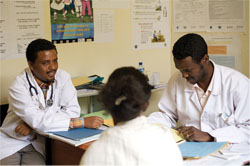5.1.4 Supervision

Monitoring information can also be gathered through supervision. Supervision is usually a meeting at which you are able to sit down with a senior colleague and discuss issues that are important in your work (Figure 5.6). It is one way to make sure that your objectives correspond to the health needs of your community. It might also be that as a Health Extension Practitioner you find yourself doing supervision of other members of your team. During that sort of supervision you can discuss, explain, justify, and obtain the commitment of community workers to the objectives of the programme. Supervision makes sure that there are no divergences between the objectives and the team’s standard of performance. It seeks solutions to any conflict that may have arisen between the health practitioners and community workers or members of your community regarding the programme objectives.
Supervision is one way to discover how tasks entrusted to different categories of worker are carried out, and under what conditions. You should be able to analyse the factors that result in satisfactory performance and uncover any obstacles to meeting your objectives. It helps you to determine the causes of difficulties.
What is the similarity between running a supervision session for a member of your team and being supervised yourself by a more senior colleague?
In both instances it should be possible to have an open discussion about work plans and how you and your team are working towards improving the health of your community.
5.1.3 Using a checklist
